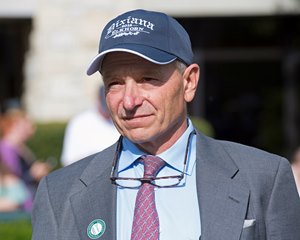Cauthen, Turcotte Talk Triple Crown Pressure


The eyes of the sporting world will focus on Justify June 9 at approximately 6:46 p.m. EDT, as the unbeaten 3-year-old attempts to become the 13th Thoroughbred to win the Triple Crown with a victory in the 1 1/2-mile Belmont Stakes Presented by NYRA Bets (G1).
Those same eyes, however, along with a dose of intense scrutiny, also will be zeroed in on Justify's jockey, Hall of Famer Mike Smith.
What's it like to grasp the reins of a racehorse on the brink of making history? How does a rider deal with the anticipation? The pressure? Few people actually know what it's like to be in that position: to be the human guide for a colt carrying more than his assigned weight—one who's toting the hopes and dreams of countless race fans around the world.
Among those who can relate to what Mike Smith will face when the starting gate doors spring open are fellow Hall of Famers Ron Turcotte, who piloted Secretariat to a 31-length triumph in the 1973 Belmont Stakes; and Steve Cauthen, who got Affirmed's nose to the wire first in the 1978 edition. Both Thoroughbreds secured the Triple Crown as a result of their victories.
"In some ways, it's a normal day for Mike Smith, another big race for Mike. He'll handle it and probably won't change anything (in his routine)," said Steve Cauthen, who was only 18 years old when Affirmed out-gamed Alydar through the sandy Belmont Park stretch. "That's the goal. You try to make it the same, but there's that anticipation. It's a big day and everybody's eyes are on you. Belmont Park was my home track, so I rode several other horses that day and even won a stake for Laz (Barrera, Affirmed's trainer) earlier on the card."

"I couldn't give Mike Smith (who at 52 would be the oldest rider to pilot a Triple Crown winner) any kind of advice. He's ridden three times longer than I did. He'll do fine," said Ron Turcotte, whose brilliant career was cut short by an on-track spill in 1978. "I'll be at Belmont Park to see it. And I'll be rooting for his horse. I missed the last Triple Crown winner (American Pharaoh in 2015, due to an automobile accident in his native New Brunswick, Canada). I'm not going to miss this one."
With cable TV's 24-hour news cycle and entire networks now dedicated solely to the coverage of sporting events—as well as the advent of the Internet, Facebook and Twitter—is the pressure and potential scrutiny tougher for a rider to face today than in years past?
"I actually think it was tougher back when I rode," said Turcotte. "Remember, it was the Golden Age of Racing. The media for racing was bigger back then. We were drawing 30,000 people (to the track) on a weekday and 50,000 on the weekends. But when it came to riding Secretariat I never felt any pressure. I knew that he was going to win the Belmont Stakes. I told Lucien (Laurin, Secretariat's trainer) that if the horse lost I would hang up my tack and never ride again. Secretariat was training faster in the mornings than horses were racing in the afternoon. He was maturing and really coming into his own, thriving on the racing."
Unlike Turcotte, who was 31 years old at the time, the teenage Cauthen did ponder the immense weight of the moment.
"I think a rider worries about letting down a great horse. I was worried I'd let (Affirmed) down. Also, everybody had so much faith in me—Laz, the Wolfsons (Affirmed's owners), especially with me being such a young rider. I didn't want to let any of them down."
What does it take to succeed at this level? To survive the grueling five-week campaign where there isn't time to miss a single beat? Competing in races at three distinctly different venues? At three different distances?
"First of all, you need to have a great horse. And you need to be lucky," said Cauthen. "You also need to have a great team around you. I think Baffert has a great team. He's already proven that (with American Pharaoh). And I know we had a great team with Affirmed."
Should a Thoroughbred who wins the Triple Crown automatically be considered among the sport's all-time greats?
"I think the term "great" gets thrown around too much today," said Turcotte. "Justify is a hell of a horse. I see the Preakness a little different than most people. I think Mike Smith saw that horse on the outside (Bravazo, the eventual runner-up) coming. I think Mike had it measured. I don't think he persevered on (Justify) the last 10 to 20 jumps. I think that even if they went around the track again, the second-place finisher probably wouldn't have caught him. Justify's a long strider. He's relaxed to the post and relaxed while he runs. I'm not saying that he's another Secretariat. But I can't fault him at all. I see levels of greatness; different grades. But it takes a hell of a horse to win these three races."
If Justify wins the Belmont Stakes, lasting memories will be made for the 3-year-old's legions of fans, including those among the expected 90,000 at Belmont who will witness it in person.
What might Mike Smith experience if that occurs? What feelings could he take forward with him in his life?
"It was an absolute pleasure," said Steve Cauthen, now 58. "One of the pleasures of my life, both then and now. Though, I've probably come to appreciate it even more now."
"(It leaves you feeling) as good as a person can feel," said Ron Turcotte, 78, "Besides being alive."
